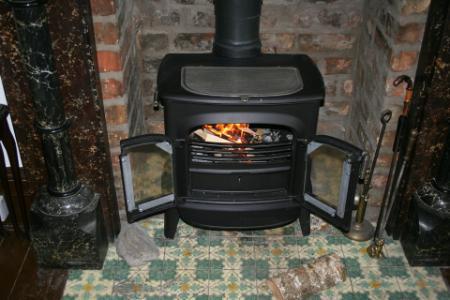Rushcliffe Borough Council is appealing to residents who own wood burning stoves to know the law surrounding their use and play their part in reducing air pollution in their neighbourhoods. More than one million homes in Britain own a wood burning stove and while they are effective at heating your home they can, if used incorrectly impact local air quality.
Burning wood and other solid fuels can contribute to pollutants including ultra-fine particulate matter, also known as PM2.5, that is not visible to the naked eye, so even smokeless fuels and appliances can cause localised pollution. PM2.5 is widely acknowledged as being the pollutant which has the greatest impact on human health with increased impacts on levels of respiratory and cardiovascular diseases and increased hospital admissions.
The Council routinely monitors and reviews air quality under the Environment Act 1995 and operates a smoke control area in West Bridgford. This means it is an offence to emit smoke from a chimney of a building, furnace or from any fixed boiler or acquire any unauthorised fuel for use within unless it is used in an exempt appliance.
As winter wood burning can contribute up to 10 per cent of local emissions in larger cities and conurbations, the authority is advising owners to act now, particularly during the colder months to ensure they are doing all they can to eradicate or minimise pollution. Here’s some top tips to ensure owners do all they can to help their local environment:
• If using an open fireplace only burn smokeless fuels. Not all fuels sold in Nottinghamshire are smokeless but if in doubt ask your supplier. • Any stove or fireplace should properly maintained and its chimney swept regularly.
• If using a stove or other appliance use normal wood as well as smokeless fuels. Usually wood that has been kiln dried or seasoned to have a lower moisture content will be much less polluting, as much as 50 per cent less pollution than emitted from burning fresh logs.
• Drier wood is more efficient, producing more heat per log.
• Wood that has the Woodsure Ready to Burn label is certified to have a low moisture content
• Never burn old pallets, furniture or scrap wood as it may contain contaminants that can be harmful to your health and the environment.
• Store fuels correctly to make sure wood does not get damp from the rain or damp in the ground.
• Open fireplaces are the most polluting way to burn solid fuels.
Using a well-designed, properly installed stove or appliance can make a big difference and The Stove Industry Alliance has introduced the Ecodesign Ready label which can emit up to 80 per cent less pollution than a normal approved appliance by the Department for Environment, Food and Rural Affairs (Defra). An up to date list of these stoves can be found at Hetas.
Rushcliffe Borough Council’s Cabinet Portfolio Holder for Environment and Safety Councillor Rob Inglis said: “We know wood burning stoves are popular ways to heat your home and that many residents take their responsibilities of minimising any pollution from their use very seriously.
“We’re appealing to all owners to take time to assess where they can make improvements to ensure they do not put themselves and their neighbours at risk of harmful pollutants.
“Burning garden waste on a bonfire can also be unnecessary and unpleasant for your neighbours so why not use our garden waste or bulk waste collection services, available on our website to always ensure you’re disposing of waste correctly.”

